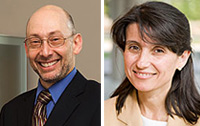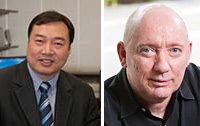October 29, 2013 – (BRONX, NY) – The National Institutes of Health (NIH) has chosen two leading aging researchers at Albert Einstein College of Medicine of Yeshiva University to chair panels at the first symposium on "geroscience"—the study of how aging influences the onset of chronic diseases.

Jeffrey Pessin, Ph.D. (left)
Dra. Ana MarÃÂÂÂa Cuervo, PhDAging is a major risk factor for major chronic diseases including cancer, cardiovascular disease and diabetes. Understanding the biological processes that underlie aging could lead to new ways of treating or even preventing chronic disease.
The NIH symposium is the first to take an integrated approach to studying diseases associated with aging. Each of its seven panels will focus on a different broad area of research: inflammation, adaption to stress, epigenetics, metabolism, macromolecular damage, proteostasis and adult stem cells and regeneration.
Jeffrey Pessin, Ph.D., director of Einstein's Diabetes Research Center, and Christopher Newgard, Ph.D., of Duke University School of Medicine, will co-chair the panel on metabolism and how making it more efficient could help fight age-related diseases processes. Dr. Pessin holds the Judy R. and Alfred A. Rosenberg Professorial Chair in Diabetes Research and is professor of medicine and of molecular pharmacology at Einstein.

Dongsheng Cai, M.D., Ph.D. (left)
Dr. Jan VijgAna Maria Cuervo, M.D., Ph.D., co-director of Einstein's Instituto de Investigación del Envejecimiento, will co-chair the panel on proteostasis with Richard Morimoto, Ph.D., of Northwestern University. Proteostasis involves preserving cell function by preventing cell proteins from either degrading or accumulating as we age. Dr. Cuervo is professor of developmental and molecular biology, of AnatomÃÂÂÂa y biologÃÂÂÂa estructural, and of medicine and holds the Robert and Renee Belfer Chair for the Study of Neurodegenerative Diseases.
Two other Einstein researchers will make presentations at the summit:
Featuring National Institutes of Health (NIH) director Francis Collins, the "Advances in Geroscience: Impact on Healthspan and Chronic Disease" scientific summit was organized by the trans-NIH Geroscience Interest Group (GSIG) with support from the Alliance for Aging Research and The Gerontological Society of America. Among the largest trans-NIH interest groups, the GSIG focuses on the relationships between aging and age-related disease and disability. More information and the Summit's agenda are available at http://www.geron.org/meeting2013/GSIG_PreliminaryAgenda.pdf.